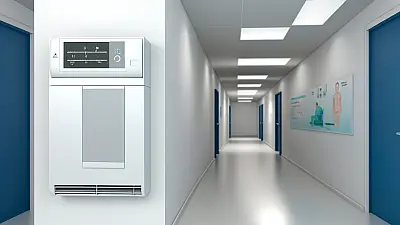AYER, MA - Apple Valley Center nursing home was cited for significant staffing violations during a June 2024 inspection, with investigators finding the facility operating with far fewer certified nursing assistants than required and taking over 45 minutes to serve breakfast meals to residents.

Chronic Understaffing Documented Throughout Facility
The inspection revealed systematic staffing shortages at Apple Valley Center, particularly affecting the North 2 Unit, a secured dementia care area housing 41 residents. According to facility records, the nursing home was supposed to maintain four certified nursing assistants (CNAs) per shift on this unit but frequently operated with only two or three staff members.
A review of staffing schedules from May 5 through June 5, 2024, showed the facility failed to meet its own staffing goals on multiple occasions. The day shift lacked adequate CNA coverage on 19 separate days during this period, while the evening shift was understaffed on 21 days.
During interviews, nursing staff described the impact of these shortages. "When they had two CNAs they could not provide incontinent care to each resident every two hours, and that even when there were three CNAs it can be difficult to get to each resident," one CNA told investigators.
A supervising nurse explained the cascading effects: "It was a real struggle when they had two CNAs, by the time the CNAs got through their first rounds on each resident, stopped care during mealtimes, it was late in the day when they started their second rounds. The CNAs are drowning when there are only two of them."
Prolonged Meal Service Compromises Food Safety
Investigators observed significant delays in meal distribution that potentially compromised food safety and quality. During the morning inspection, surveyors documented that breakfast service on the North 2 Unit took over 45 minutes to complete, far exceeding the facility's own standards.
The Director of Nurses had established an expectation that meal service should be completed within 10-15 minutes to ensure food remained at appropriate temperatures. However, CNAs reported they were "usually done passing breakfast trays by 9:00 A.M., approximately one hour after the meal trucks scheduled time of arrival."
These delays occurred because understaffed units couldn't properly coordinate care schedules with meal times. CNAs explained they were supposed to suspend resident care at 8:00 AM to begin breakfast distribution, but staffing shortages made this timeline impossible to maintain.
Extended meal service times present multiple health risks. Food temperatures can drop below safe levels, potentially leading to foodborne illness or reduced nutritional value. For residents with swallowing difficulties or diabetes, delayed meals can affect medication timing and blood sugar management.
Family Reports Highlight Care Delays
The staffing shortages directly impacted individual resident care, as documented through family complaints. One family member reported finding their relative "in bed with a top sheet, blanket, and hospital gown that were wet from urine and diarrhea" on two separate occasions in May 2024.
When the family member inquired about the delays in care, "she was told by nursing they were short staffed" both times. These incidents occurred on different days, suggesting the problem was persistent rather than isolated.
Proper incontinence care is critical for preventing skin breakdown, urinary tract infections, and maintaining resident dignity. Federal regulations require nursing homes to provide necessary care to prevent complications and maintain each resident's quality of life.
Facility Assessment Shows Major Staffing Gaps
The facility's own assessment, completed in February 2024, revealed the scope of staffing challenges. While the nursing home was licensed for 123 beds, it employed only 11 full-time equivalent CNAs despite determining it needed 29. Similarly, the facility employed four registered nurses while its assessment indicated a need for eight.
This represents a staffing deficit of 62% for CNAs and 50% for registered nurses compared to the facility's own calculated needs. Such significant shortfalls make it virtually impossible to provide timely, quality care to all residents.
The Schedule Coordinator told investigators she "did not consider a unit to be short staffed unless there was only one CNA on duty," a standard that falls well below industry best practices and the facility's own staffing goals.
Previous Violations Show Ongoing Pattern
This June inspection was conducted as a follow-up to previous violations identified in March 2024. The facility had submitted a plan of correction with a compliance date of March 25, 2024, promising to audit staffing ratios weekly for four weeks, then monthly for three months.
However, the Administrator admitted during the June inspection that "none of the staff to resident ratio audits for May 2024 had been done, as indicated in the Facility's Plan of Correction." This failure to implement promised oversight measures demonstrates ongoing compliance challenges.
Additional Issues Identified
The inspection also documented that the facility supplemented with agency staff but continued experiencing "a lot of call outs" according to the Administrator. The facility's staffing challenges particularly affected the secured dementia unit where many residents required two-person assistance for care and exhibited behavioral symptoms requiring specialized attention.
Full Inspection Report
The details above represent a summary of key findings. View the complete inspection report for Apple Valley Center from 2024-06-05 including all violations, facility responses, and corrective action plans.
💬 Join the Discussion
Comments are moderated. Please keep discussions respectful and relevant to nursing home care quality.